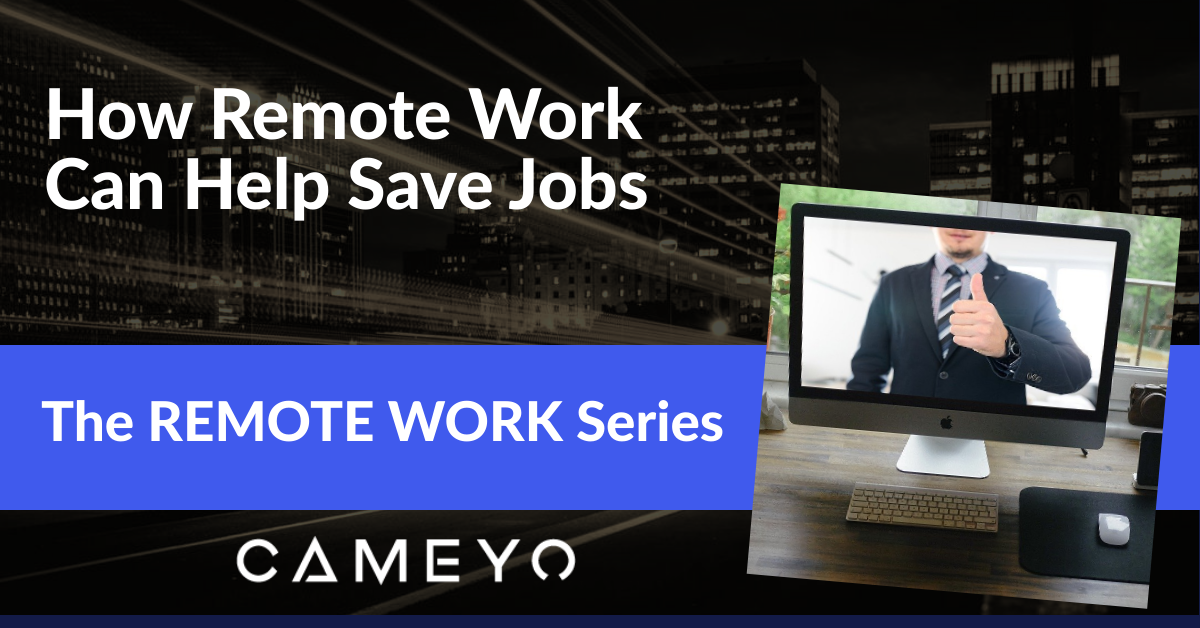In a conversation with CNBC’s Jim Cramer, Cisco’s CEO Chuck Robbins shared some of his thoughts on how remote work is changing the landscape of “business as usual” moving forward. Last week, we wrote about how Cameyo has always been a virtual team and the value of being able to hire the best talent, no matter where they live. 
Cisco’s Robbins agrees:
“I think this has given us confidence that we can hire talent anywhere and have them participate productively on teams, regardless of their location,” said Robbins.
Robbins also became the latest CEO to confirm that – when people do start heading back to the office – it’s going to be a “hybrid model” moving forward.
“I think you’ll see many employees that will continue to work from home, you’ll have many that will get back to the office and then you’ll have some that’ll do a little bit of both,” said Robbins.
And finally, and this one is particularly interesting when you think about the financial impact on companies, Robbins said:
“I think it will affect how companies think about their commercial real estate footprint.”
This short conversation with CNBC reveals a lot about the broader shift in thinking that’s happening at big companies around the world. But more importantly, this helps shine a light on the role that remote work can play in helping companies reduce their costs. Which has the potential to help save jobs in the long run.
Letting Your Talent Live Anywhere
Being able to hire talent anywhere in the world is a huge benefit, but there’s also a big benefit in terms of what this statement means for existing employees. As Robbins notes, this forced experiment of working from home has “given us confidence” that people can work from anywhere and still be productive members of teams.
This means that – beyond hiring NEW talent anywhere – we should also consider the value of letting our EXISTING talent live wherever it wants to.
Think about the potential economic impact of that freedom. In many cases – especially in the Silicon Valley where home prices and rent are sky high – enabling your talent to move elsewhere while keeping there jobs could enable your employees to go somewhere with a more realistic cost of living. They could go somewhere where the money they make goes further, all while saving you the cost of having that person in a physical office building.
Rethinking Commercial Real Estate Footprints
If people are able to work from – and live – anywhere, then businesses have an opportunity to rethink the massive expense of their office spaces. Whether you’re a large company like Cisco with offices around the world or a company with just one building – the amount you could save by consolidating office space to only what is needed to support the hybrid workers who still occasionally come into the office could be massive.
In fact, the analysts at Global Workforce Analytics estimate that “if those employees who held telework-compatible jobs (50% of the workforce) and wanted to work at home (79% of the workforce) did so just half of the time (roughly the national average for those who do), the economic benefit would total over $700 billion a year.”
Their report identifies the following savings:
- Save over $500 billion a year in real estate, electricity, absenteeism, and turnover and productivity, that’s more than $11,000 per employee per year.
- Increase national productivity by 5 million man-years or $270 billion worth of work.
- Additionally save on utilities, janitorial services, security, maintenance, paper goods, coffee and water service, leased parking spaces, transit subsidies, ADA compliance, environmental penalties, equipment, furniture, and office supplies.
Not only has working from home proven to be extremely popular with employees, it’s clear that companies are realizing the benefits as well. And when you factor in the financial savings that can be gained by enabling remote work, there’s a case to be made for the fact that having more people work from home could help companies around the world save jobs in a down economy by reducing their real estate costs and other associated cost savings. Even if companies needed to temporarily reduce salaries instead of having layoffs, by enabling people to live and work from wherever they want (instead of needing to be in expensive major metros near their offices), people could choose to live in a more affordable area.
The “new normal” of remote work and hybrid work (working from home and the office) requires companies to shift their thinking in how they enable employees to be productive from anywhere. But this new normal could also provide the long-term flexibility that enables companies and employees to weather this storm.
